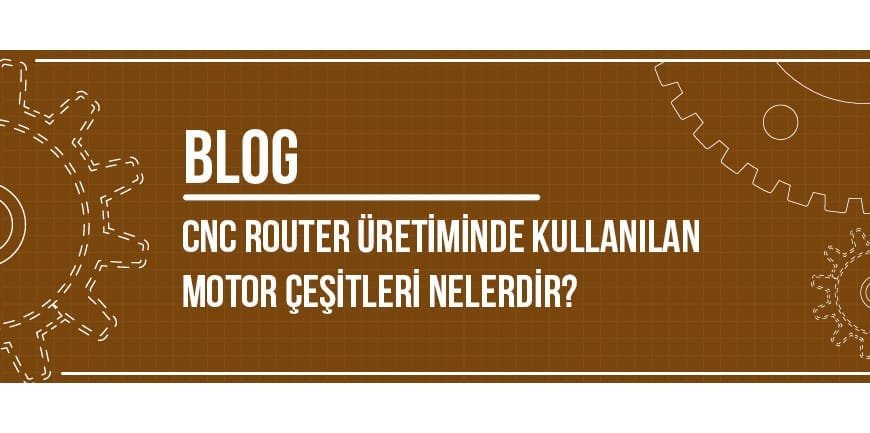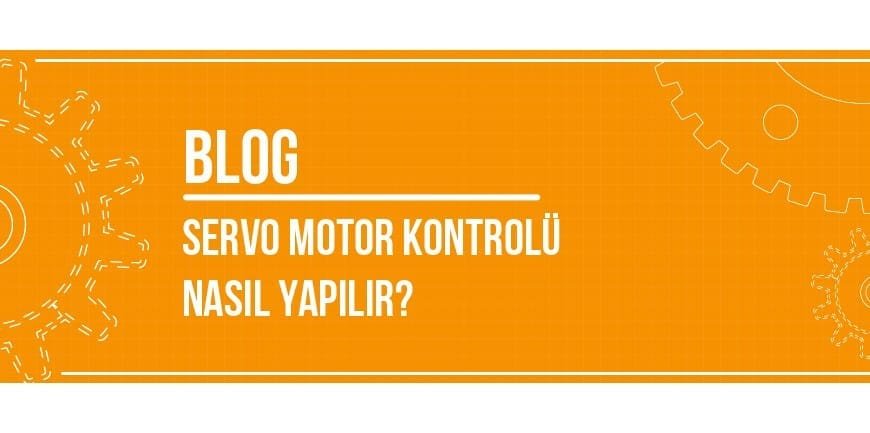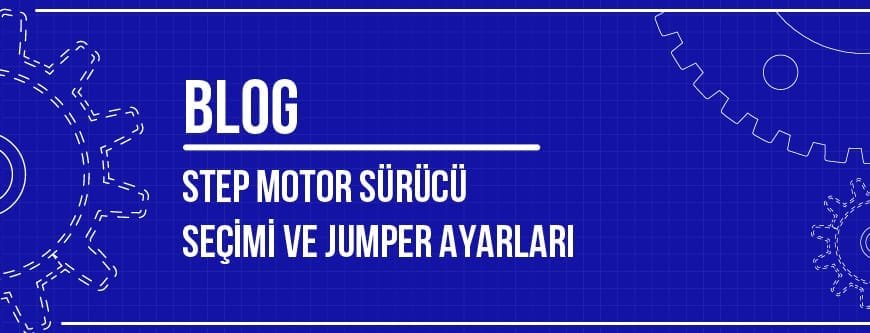
İçindekiler
What are the Motor Types Used in CNC Router Production?
Motor selection is very important in CNC routers. The main reason for this is that the motor directly affects the performance, accuracy, and processing quality of the CNC router. It is precisely at this point that we have created the content “What are the types of motors used in CNC router production?” to guide you in motor selection in order to improve the performance of your CNC router. You can find the right motor selection by reviewing our content.
Why is motor selection important in CNC router production?
CNC routers, which play a very important role in industrial fields, are used to process materials with high precision and efficiency. The effectiveness of these high-performance machines is directly related to the quality and characteristics of the motors used. For this reason, great care must be taken when selecting the type of motor. At this point, you must carefully evaluate the motor types, conduct the necessary analyses, and make informed decisions. This is because the motors selected for CNC routers directly impact the machine’s speed, torque, and overall performance. For example, while stepper motors ensure the precision and control of CNC routers, servo motors meet the high speed and power requirements of CNC routers. Therefore, when selecting motors, not only the current requirements of the machine but also future application needs must be considered. This will enhance production efficiency and strengthen the competitive edge of businesses.
What Should Be Considered When Selecting Motors for CNC Router Production?
When selecting motors for CNC router production, it is beneficial to pay attention to certain key points. These benefits can be divided into eight categories: motor type, torque and power requirements, speed, control system, size and weight, heat management, and cost. If we examine these factors in detail:
- Motor Type: Different motor types, such as stepper motors and servo motors, should be selected according to application requirements. Stepper motors provide precise motion control, while servo motors offer high speed and torque.
- Torque and Power Requirements: Depending on the type and thickness of the material to be processed, the required torque and power values must be determined. This ensures that the motor can operate properly.
- Speed: The maximum speed that the motor can reach while rotating affects the efficiency of the production process. Therefore, the speed requirement may vary depending on the type of processing.
- Control System: It must be compatible with the system to be used for motor control (e.g., CNC control software). This way, you can optimize the motor’s performance.
- Dimensions and Weight: The dimensions and weight of the motor affect the structural design of the CNC router. Appropriate dimensions should be selected to ensure balance and stability.
- Heat Management: The heat generated by the motor during operation can affect its performance. Therefore, appropriate cooling methods should be considered to ensure heat dissipation.
- Cost: The cost of the selected motor must be compatible with the budget. However, motors that offer the best value in terms of quality and performance should be preferred.
What are the types of motors used in CNC router production?
There are three types of motors used in CNC router production. These are determined according to the needs of the CNC router. The types of motors mentioned are stepper motors, servo motors, and spindle motors.
Stepper Motors
Stepper motors have the ability to move step by step due to their structure. Therefore, thanks to their integrated feedback mechanisms, their precise positioning and speed control capabilities are highly developed. At the same time, they increase the processing capabilities of CNC routers while also providing operators with detailed control options. As a result, they are frequently preferred in CNC router production.
Servo Motors
Servo motors, a type of motor frequently preferred in CNC router production, stand out for their high precision, fast response time, and powerful torque. In this context, thanks to feedback systems, they monitor the motor’s position, speed, and torque in real time and make adjustments when necessary to deliver flawless performance. Thanks to these features, servo motors are ideal for CNC routers. Within this framework, servo motors enable the execution of more complex and faster cutting operations in CNC router machines.
Spindle Motors
Spindle motors, another type of motor preferred in CNC routers, play an important role in cutting, engraving, and shaping processes by providing high speed and power. These motors are preferred for applications that require precise cutting and detailed processing. The reason for this is that they increase cutting quality in different materials with their high rotation speeds and powerful torque capacities. Additionally, spindle motors ensure that the cutting tools used in milling operations rotate accurately and stably, delivering effective results when cutting various materials such as wood, metal, and plastic. Thus, spindle motors optimize the process through their speed control features, thereby improving both work quality and reducing processing time.
Advantages of Stepper Motors in CNC Router Manufacturing
Stepper motors offer significant advantages in CNC router production because they enable precise positioning and control. The most important of these advantages are high accuracy and repeatability. In this context, the advantages of stepper motors in CNC router production can be summarized as follows:
- Precise Positioning: Stepper motors can be positioned with high precision because they move step by step. This offers a significant advantage, especially in detailed cutting and engraving processes.
- Repeatability: At the same time, stepper motors can reach a specific position with repeatable accuracy at each step. This enables consistent results in CNC router operations.
- High Torque: Stepper motors that can generate high torque even at low speeds facilitate the processing of heavy materials and provide stable performance during cutting.
- Cost-Effective: Stepper motors, which are less expensive than other types of motors, provide cost-effectiveness in CNC router systems.
- Durability and Low Maintenance Requirements: Thanks to their simple and robust design, stepper motors are long-lasting and require minimal maintenance.
- Easy Control: Step motors, which can be easily controlled with digital signals, provide precise and flexible motion control in CNC router systems.
Advantages of Servo Motors in CNC Router Production
CNC routers offer many advantages over servo motors. These advantages include high precision, fast acceleration, and high torque. If we examine these advantages in detail:
- High Precision: Servo motors can operate with very high precision and reach the desired position accurately thanks to their feedback system, which enables real-time position tracking. This provides superior accuracy in detailed and complex cutting operations.
- High Speed: Servo motors enable CNC routers to operate faster and more efficiently with their rapid acceleration and deceleration capabilities. High speed performance saves time, especially in serial production.
- Higher Torque: Servo motors have the capacity to generate high torque, which facilitates the processing of heavier and more resistant materials and delivers powerful performance in demanding processing applications.
- Feedback System: Thanks to feedback mechanisms such as encoders, servo motors provide highly accurate position control by minimizing error margins. This system detects deviations during motor movement and automatically corrects them.
- Energy Efficiency: Servo motors consume only the energy they need, making them energy efficient. They optimize energy consumption in CNC router systems and save costs.
- Quiet Operation: Servo motors operate at low noise levels, providing a quieter working environment and increasing operator comfort.
Advantages of Spindle Motors in CNC Router Manufacturing
CNC router üretiminde spindle motorlar, yüksek hız ve güç gerektiren işlemler için sundukları avantajlarla öne çıkar. Bu bağlamda cnc routerların spindle motorlara sağladığı avantajlar şu şekildedir;
- High Rotational Speeds: Spindle motors can reach very high rotational speeds, enabling fast and clean cuts in materials such as wood, metal, and plastic. This speed improves cutting quality, especially in detailed and precise operations.
- High Power and Torque: Spindle motors provide high torque even under heavy machining conditions, allowing them to easily process difficult materials. Powerful torque in CNC routers enables larger and denser materials to be cut smoothly.
- Long-Term Continuous Operation: Spindle motors can operate at high performance for long periods of time because they are equipped with cooling systems. This enables continuous operation in production processes and increases efficiency.
- High Cutting Quality: The constant speed and powerful rotation provided by spindle motors ensure smoothness and evenness on cutting surfaces. This results in professional quality in the processed products.
- Quiet and Stable Operation: Spindle motors operate with low vibration, providing quiet and stable performance in CNC routers. This enhances operator comfort and ensures machine accuracy during precision operations.
- Use of Various Tips and Tools: Spindle motors work in conjunction with different processing tips and cutting tools, which increases the versatility of CNC routers and makes them suitable for different applications.
Which Motor Type Should Be Used in Which Situation?
One of the most frequently asked questions in CNC router production is undoubtedly which type of motor should be used in which situation. At this point, the selection should be made based on the requirements of the job to be performed on the CNC router. Thus, the motor type can be determined to suit the speed, precision, and power requirements of the task. Otherwise, an incorrect motor selection can lead to a decrease in processing quality, time loss, and increased costs. Therefore, particular attention should be paid to motor selection.
At this point, stepper motors should generally be preferred for processes that require precise positioning and repeatability. This is because these motors are low-cost and their simple structure provides sufficient accuracy for detailed cutting processes. On the other hand, servo motors should be preferred for applications that require high speed and precision. Servo motors minimize error margins and enable rapid acceleration thanks to their feedback systems. Finally, spindle motors are ideal for applications involving the processing of hard and dense materials, continuous operation over extended periods, or high rotational speeds. Their high torque capacity and robust performance enable precise cutting of materials such as metal or thick wood.
In light of all the reasons mentioned above, when selecting a motor, you should determine the most suitable motor type by considering the type of work, speed and accuracy requirements, and the characteristics of the material to be processed.
Motor Control and Drive Systems in CNC Routers
Motor control and drive systems in CNC routers play a critical role in ensuring precise movement and position control. This is because motor control enables precise positioning and smooth movement during machining operations. Motors used in CNC routers (such as stepper motors, servo motors, and spindle motors) are controlled according to specific accuracy and speed requirements. Driver systems are used to control the movement and speed of these motors. These drivers manage the CNC router’s movement capabilities by adjusting the motor’s speed, torque, and direction. Additionally, in servo motors equipped with feedback mechanisms, driver systems continuously monitor the motor’s position and make necessary adjustments, thereby minimizing error margins.
The Effect of Motors on CNC Router Performance
Motors are one of the most important components that directly affect the performance of CNC routers. The speed, torque, and precision provided by the motors determine the quality and efficiency of the machining processes. For example, a motor with high torque capacity provides the power and durability required to process denser and harder materials, allowing the cutting process to be completed more quickly and efficiently.
In addition, the level of precision of the motors is of great importance in the processing of complex and detailed patterns. The main reason for this is that precision directly affects the final quality of the processed part.
Maintenance and Lifespan of CNC Router Motors
It is essential to pay close attention to maintenance routines in order to maintain motor performance and extend their service life. This is because these motors are exposed to intense working conditions and may experience wear and tear over time, which can lead to performance degradation and even malfunctions. At this point, when performing CNC router maintenance, the first step is to periodically clean the motors and remove any dust buildup. Additionally, the tightness of motor connections must be checked, and any loose connections must be tightened. This helps eliminate vibrations in the motor. Finally, lubrication procedures must be performed regularly. This reduces wear on the motor’s moving parts. However, the correct lubricants must be used, and over-lubrication must be avoided. By following these maintenance routines, you can extend the service life of your CNC routers.
If you are looking for a servo motor, stepper motor, or spindle motor suitable for CNC routers, you can check out Şahin Rulman’s high-quality motor options.
Diğer Blog Yazılarımız






